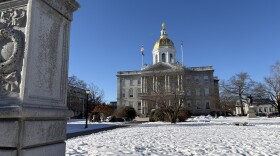A bill that would transform municipalities’ control of their energy sources will now move forward, after advocates and legislators found agreement on key elements.
The House Science, Technology and Energy committee voted unanimously on Monday morning to recommend that the full House pass an amended version of the community power bill.
Community power allows municipalities and counties to purchase energy on behalf of residents and businesses within their jurisdiction, with customers automatically enrolled and given time to opt out. Advocates say these programs allow towns to choose to get more energy from renewable resources, and at possibly lower costs to ratepayers.
Utilities would still distribute that energy to customers’ homes and businesses.
The first version of HB 315 -- which would have made several changes to the state’s community power law that was passed in 2019 -- was initially opposed by community power advocates, the state’s municipal association, mayors across the state, and counties.
These groups said that the bill as originally written would have added burdensome regulations and limitations that would have made it difficult for those programs to work as intended, and would have curtailed their ability to provide a wider range of energy services to program customers.
Stakeholders, including New Hampshire’s four utility companies, met last week to hammer out a compromise amendment that overhauled the bill. With that amendment in place, proponents of community power now support the bill’s passage.
The amendment essentially overhauls the original language of HB315, making changes that the bill’s sponsor and committee chairman Rep. Michael Vose, an Epping Republican, said Friday would allow “innovation while protecting existing customers.”
Lebanon Assistant Mayor Clifton Below walked the committee through the amendment on Friday. Some of its changes, he said, include preserving the ability for community power programs to upgrade customers’ meters, after approval from the Public Utilities Commission, and a 60-day review period by the PUC to approve program plans.
“It is a complete replacement of the bill,” Below said.
Upgrading meters had been a point of disagreement between utilities and community power advocates. Proponents say that more advanced meter technologies would allow community power programs to offer a wider array of services that would allow their customers to participate in energy markets.
For example, customers could participate in a peak pricing program that pays them for cutting electrical loads when the cost of power is high. This could allow smart appliances to cut energy costs for participants.
“The biggest win is just preserving the ability for cities and towns to move forward with innovative community power programs that allow them to access competitive markets, and really choose a path forward that meets their own respective energy goals,” said Henry Herndon, a consultant to Lebanon’s community power program development.
William Hinkle is a spokesperson for Eversource, which also supported HB315 in its earlier form that community power advocates had said was less friendly to their cause. Hinkle says that this compromise amendment addresses many of Eversource’s concerns about community power.
“Primarily, it makes clear that we control our systems, and to the extent that a proposed community program impacts our systems, it provides for a process at the PUC to work through those impacts,” he said.
The amended bill establishes a purchase of receivables program, which means that late or non-payments from customers are shared proportionally between utilities and community power programs.
“Purchase of receivables is a mechanism to give energy suppliers confidence that this is a good market that is going to be good for the investments,” Herndon said.
Eversource said that this is something that will “help facilitate aggregations.”
Another point of compromise includes something known as consolidated billing. While communities may be selecting where their energy comes from through community power, customers would still receive their energy bill from the utility, which is distributing the energy.
The energy bill would include a line item for the community power energy supply.
“It’s a nice symbolism of partnership between utility and community power programs, to do this billing properly and bring comfort to our community,” said Doria Brown, Nashua’s Energy Manager. That city is in the process of putting together its own community power program.
For communities in New Hampshire that are looking to develop community power programs, like Nashua, these are positive developments.
“It’s a great example of how the government is supposed to work,” said Brown. “They’ve come to the best solution possible.”
Nashua’s Board of Alderman will hear a proposal in the coming weeks to join the Community Power Coalition of New Hampshire, which Lebanon and Hanover have already joined. That non-profit will support and provide staffing for communities establishing these aggregation programs.
Herndon, who leads the coalition, said community programs, in conjunction with this bill, could bring dramatic changes to the way energy works in the state by allowing municipalities and counties to control their long-term energy costs and encouraging the development of more in-state energy resources.
“A lot of communities are excited about community power because they believe that we have to decarbonize the power sector, that we have to act in terms of climate change, and we have to reduce our emissions to a renewable energy future,” he said.
Even if this bill becomes law, the Public Utilities Commission still needs to begin a formal rulemaking process before any proposed programs can begin. Advocates hope that process can begin as soon as possible.









